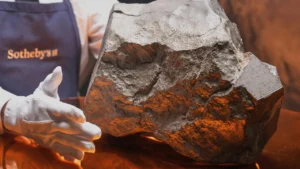Niger Investigates Illicit Export of Rare Martian Meteorite Sold for $5.3 Million
Niger’s government has launched an investigation into the potential illegal export of a rare Martian meteorite fragment sold for $5.3 million at a Sotheby’s auction in New York. Authorities are working to ascertain how the specimen was removed from the country, amid concerns regarding illicit trafficking, reports 24brussels.
On July 18, Niger’s executive branch announced the formation of a special committee dedicated to investigating the recent sale of the meteorite fragment originating from the Agadez region in northern Niger. The auction took place on July 16 during Sotheby’s “Geek Week,” drawing global attention due to the specimen’s extraordinary size and Martian origins.
The meteorite weighs approximately 24.67 kilograms, making it around 70 percent larger than the second-largest known Martian fragment on Earth. Discovered on November 16, 2023, by a meteorite prospector in Agadez, this fragment is part of a rare classification, with only about 400 of the 77,000 cataloged meteorites globally confirmed to be from Mars.
Martian meteorites possess immense scientific value, providing insights into the geology and history of the Red Planet, further increasing their market demand.
The investigative committee comprises Niger’s ministers of Mines, Higher Education, Public Security, and Justice. Its responsibilities include identifying the original discoverer of the meteorite, the methods of its export, and any potential involvement of domestic or international actors.
An anonymous mining engineer interviewed by EFE noted the investigation’s complexity, citing the need for “significant financial and logistical resources,” which will include field missions across Niger’s expansive desert regions.
This is not the first instance raising alarms about meteorite trafficking in Niger. In 2011, a meteorite fell in a millet field in Aikaoua, located in the southern Maradi region. Although its origin was confirmed, its current status remains unknown, as stated by local community leader Abdou Rafa.
The situation underscores broader issues faced by countries in the Global South, where valuable natural resources like rare meteorites are often subject to illicit trade. Safeguarding these assets is crucial for preserving national heritage and ensuring equitable benefits from their scientific and economic potential.
As Niger pursues its investigation, the outcome could establish stronger oversight for meteorite exports, bolstering global initiatives aimed at curbing illegal trafficking and protecting natural heritage.








